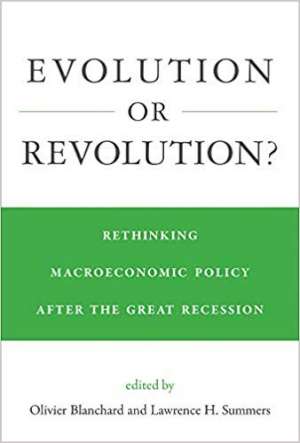02 December 2019
Evolution or revolution:
Rethinking macroeconomic policy after the Great Recession
Edited by Olivier Blanchard and Lawrence H Summers
2019, MIT Press, 392 pages,
ISBN 9780262039369
Speaker: James Smith, Resolution Foundation

The Great Depression led to a profound shift in the way we think about macroeconomic policy – not least with Keynes writing his seminal General Theory. But a decade after the financial crisis, we’re largely thinking about macroeconomics, and particularly macroeconomic policy, in the same way as we were before the crisis. (This is a slightly unfair description, but only slightly…) This begs the question: is this because we just need to tweak the existing policy framework, or is radical change required?
This is the inspiration for a new book edited by Olivier Blanchard and Larry Summers. It is essentially a conference volume, combining contributions to an event held at the Peterson Institute in October 2017. Conference volumes can be dry, and are often written for an academic audience. But with a stellar cast writing for a policy-orientated audience, this book rises above the sum of its parts and becomes an essential look at the key issues for contemporary macroeconomic policy.
The book is split into five parts, with each anchored by a major contribution from a leading expert in his or her field. These are brought together with responses from other big names. First up is Ben Bernanke on monetary policy. As you’d expect, his chapter is a definitive take on the big issues facing central banks today. It focusses on the ability of current monetary policy tools to defeat the zero lower bound, and what that means for the independence of central banks. You get the insights you might expect from a Fed Chair, with the frankness of someone no longer constrained by having every word put under a microscope. The responses from Mario Draghi, Adam Posen, Philip Hildebrand and others add to the impression that you are reading a blueprint for the future of monetary policy.
The other parts are also essential reading for anyone interested in macro policy, but vary in terms of their depth and breadth. Alan Auerbach’s piece on fiscal policy dives straight into the weeds of how fiscal policy should be used in a low rate environment. Andy Haldane (and co-authors) give a thorough tour of the state of macroprudential policy today, particularly as practised by the Bank of England. But, inevitably, much must be left to future work given financial policy is still developing with practice arguably running ahead of theory. Jason Furman’s chapter on inequality is characteristically practical and empirical, providing a roadmap for anyone looking to practise inclusive growth policy. Finally, Gita Gopinath reminds us that there is life beyond the US-centric closed-economy debate, and that policy is even harder for countries at the whim of international capital markets (like the UK).
But perhaps the highlight of the book is the editors’ introduction. It is a whistle-stop tour of macroeconomic policy issues, starting from first principles. It is as deep as you would expect from two of the most recognisable macroeconomists on the planet, but is also punchy and opinionated – you can almost feel the pen being wrestled between them. A key message is that economies do not self-stabilise and policy makers need to be active to avoid future economic catastrophe. They also come across as particularly worried about the gap between what central banks are expected to do, and what they can achieve with the tools at their disposal. This gives rise to a call to arms on future fiscal policy activism.
Finally, they are circumspect about what we should expect from macroprudential policy (and are almost dismissive of the stress testing regime that has become the cornerstone of what most central banks do in this area).
Ultimately, this is a collection of essays, many of which are available online. So why buy the book? For me, it’s about the quality of the contributions. Every chapter adds to the existing received wisdom. And the ‘from first principles’ approach, combined with the non-technical way it is written, makes it an essential reference for anyone interested in macroeconomic policy. Perhaps the proof of the pudding is in the eating: I’ve had this book sitting on my desk over the past few weeks and have dipped into it numerous times (although I have been writing an assessment of the UK macroeconomic policy framework*).
* The author recognises the utterly shameless nature of this piece of gratuitous self promotion.
